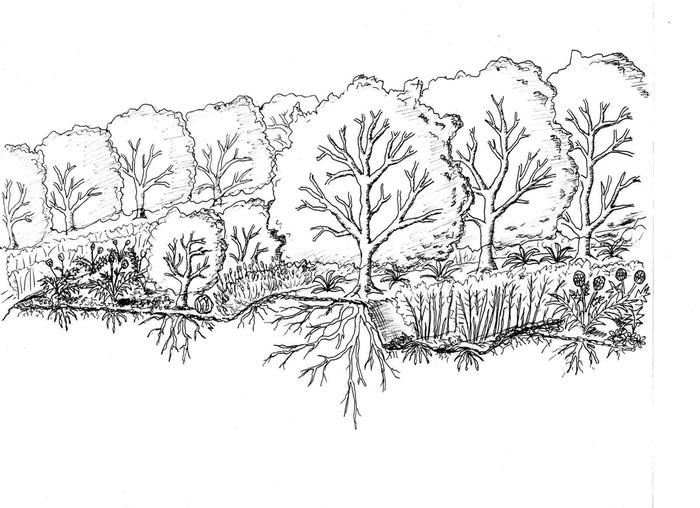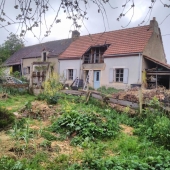posted 17 years ago
Homesteading is purchasing a claim from an authorized authority - usually federal - at a highly reduced price in exchange for development. For example 100 acres for 50 dollars with the agreement that the homesteader will 1) erect a permanent structure within (commonly) three years. 2) develop the land into (commonly) fields, gardens, meadows or some other functioning provision-producing stretch or 3) develop a working mining operation, implying successful. If the terms of the agreement are not met - for example the claim does not produce a functioning mine or the homesteader does not manage to erect a permanent structure or adhere to other requirements of the claim agreement then the land reverts back to the original authority and is resold ( for a higher price because it has been partially developed even though the terms of the agreement have not been met).
The federal pay off is an influx of individuals and families that slowly construct, at their own expense and labor, functioning widespread communities that are then further developed by federal, regional and state organizations over time, saving the federal developers money and legal intricacies. The homesteads have varying clauses, most shortchanging the homesteader. The pay off for homesteaders is the ability to purchase their own land, farm to their own standards, get rich with a previously unclaimed mine and generally "live free" - that is unregulated by local authorities. It is still done occasionally but there is not much undeveloped land left, even here in the relatively large United States. The big drawback is the ability of a federal government to rescind its offer at anytime, forcing established and legal homesteaders off their developed property as happened when the railroads were built in the US. It is more economically advantageous for the authority to negate the legality of its own contracts for a more lucrative venture(like railroads or power-lines)and the homesteads have cleared the land already.
Urban homesteading can mean two things. There is a new development scheme underway by cities and regions in highly isolated areas of the country that draws citizens with "homesteads" - reduced prices on tracts of land in "community grids" with the agreement that the "homesteader" has the home built. There are all sorts of perks attached involving available employment and "standards of living" pluses that vary from region to region. For example, a small dying town in Oklahoma might offer tracts of local land at a very reduced price in exchange for homes built at purchaser's cost (sometimes the house is included with the land) with the preference for "professionals" or those who can contribute to reinvigorating the town. There are clausesabout who can move there andwhatt hey canbring to the town. A small town in Alaska recently did this. First come first buy for 10, I think, or 15 very affordable houses on land. The idea is to lure citizens into undeveloped locations to expand capability for development.
Another meaning is the same as "Good Neighbors" - the sitcom. Purchasing an urban property and developing a functioning homestead. Water barrels instead of city water. Wood stove instead of electric. Cold box instead of refrigerator. Reducing reliance on the grid to an absolute minimum even while remaining within the perimeter of the grid. It can be very difficult to do this within city limits. The need for animals becomes a regulatory problem. Slaughter and breeding a definite difficulty. The "need" for "neighborhoods" with ever increasing property values can make neighbors unfriendly and downright negative about the effort. Operating off the grid means making do and many urban homesteader pack rat to recycle garbage and reduce reliance - this is the same as collecting and using what is found on a wilderness homestead (river stones instead of importing cement, etc) but it creates "trashy" appearance that cities and neighborhoods try to remove from their midst. The list goes on - how do you earn the little money needed if there is no farmer's market for your garden produce or no one to sell your canned goods to and no one anywhere who does trades?
Basically,this type of homesteading tries to challenge and counteract urban conformity and (urban) loss of independence on several levels. Also, there are few opportunities for homesteading in the rough and urban homesteading is all that is left. Think about how many people in the central and western United States are there by means of pioneering families - it is part of family legacies and there are certain "types" of people that are drawn to pioneering, to the challenges and threats and hardships. The urban setting is stifling to them but there is nowhere else left to go.
re:
[I've heard people refer to it as the practice of living on public land and starting to farm it as your own.
-I've also heard it used as an equivalent of living a sustainable lifestyle on your land, in ranges of sustainable energy all the way to back-to-the-land mentalities.
-Some use it in the same breath as permaculture.
-I've even heard of urban homesteading, but not sure what that means either.
What are the lines between homesteading and sustainable farming techniques? ]
Permaculture is a type of farming that allows the farming to complement the natural region and the natural processes of the region. It includes sustainable farming (and wildcrafting) because sustainable means balanced - balancing techniques - to allow what is depleted to recover (not overusing to depletion as tends to happen in a consumer-driven economy). That is also major focus of permaculture.
Many use the term homesteading to mean "off the grid" to some degree. Like rain barrels, etc. Most sustainable and permaculture efforts include aspects of homesteading.
In short, homesteading means "by your own efforts developing a tract of land to allow for long-term survival." Survival does not mean survivalist, although survivalists opt for homesteading as part of their "decentralized government" political theories (types vary). Survival is the actual act of walking 50, 100, 500 miles into the wilderness to your new piece of land which is choked with brush, towering with trees, not ideal where water is concerned, limited by natural terrain like mountains, rivers, soil, etc, and figuring it out with a hand saw, a second hand rifle, a plow you built yourself, no livestock at first and a lot of work. If you can get a house built, a garden planted, a trapline set, a weir raised, etc before the first snow sets in so that you have shelter and food for the length of winter you have successfully survived. There were 2 pretty good TV shows on PBS a couple of years back - one in Canada and one in the US. Both were about pioneering (homesteads are lands claimed by pioneers). Modern day families volunteered to become pioneers. Out of groups of about 5 the failure rate was about 3 families - 3 families would not have survived the winter and either died or were an unrelenting burden on their nearest neighbors.
There is a philosophical difference between "homesteading" and "sustainable farming." Homesteaders do not care if they treat the land gently. They are not necessarily concerned with "earth friendly" or "green" techniques. They are interested in minimizing labor while maximizing self-reliance. They tend to be conservative politically even if they do not agree with the established government. They are interested in living on their own terms and developing a living situation that allows them to be as self-reliant/self-sufficient as they can personally manage.
Sustainable farmers are different (generally). Earth friendly and green ideals are usually ascribed to urban dwellers interested in remaining part of the economy and the "grid" but also wanting to be less intrusive to the natural world. Homesteaders, as pre-urban developers, are very intrusive and even destructive even though their means of intrusion and destruction are limited by what they can carry in. Sustainable farms on the other hand, work very hard to minimize intrusiveness even if it means maximizing effort. Permaculture tries to balance those two approaches to varying degrees of success.
Homesteading is an American term but the act is international.



























 5
5





 3
3




 4
4








